Tuesday, March 16th 2021

Intel Launches 11th Gen Core "Rocket Lake": Unmatched Overclocking and Gaming Performance
The 11th Gen Intel Core S-series desktop processors (code-named "Rocket Lake-S") launched worldwide today, led by the flagship Intel Core i9-11900K. Reaching speeds of up to 5.30 GHz with Intel Thermal Velocity Boost, the Intel Core i9-11900K delivers even more performance to gamers and PC enthusiasts.
Engineered on the new Cypress Cove architecture, 11th Gen Intel Core S-series desktop processors are designed to transform hardware and software efficiency and increase raw gaming performance. The new architecture brings up to 19% gen-over-gen instructions per cycle (IPC) improvement for the highest frequency cores and adds Intel UHD graphics featuring the Intel Xe graphics architecture for rich media and intelligent graphics capabilities. That matters because games and most applications continue to depend on high-frequency cores to drive high frame rates and low latency.With its new 11th Gen desktop processors, Intel continues to push desktop gaming performance to the limits and deliver the most amazing immersive experiences for players everywhere.
At the top of the stack is the 11th Gen Intel Core i9-11900K, featuring unmatched performance with up to 5.3 gigahertz, eight cores, 16 threads and 16 megabytes of Intel Smart Cache. The unlocked 11th Gen Intel Core desktop processor supports fast memory speeds with DDR4-3200 to help enable smooth gameplay and seamless multitasking on this platform.
Improvements in this generation include:
Superior Tuning and Stability: 11th Gen Intel Core desktop processors introduce new overclocking tools and features for more flexible tuning to achieve unmatched speeds and superior game performance. This generation includes real-time memory overclocking which enables changes to DDR4 frequency in real time, extending memory overclocking support for H570 and B560 chipsets allowing users to experience overclocking, Advanced Vector Extensions (AVX) 2 and AVX-512 voltage guard band override, and an all new integrated memory controller with wider timings and Gear 2 support (in addition to Gear 1 support).
Media and Streaming Features for Days: The new 11th Gen Intel Core S-series delivers rich media experiences, from AAA gaming to high-definition streaming with additional features including DDR4-3200 MHz support, 20 PCIe 4.0 lanes, Intel Quick Sync Video, enhanced media (10-bit AV1/12bit high-efficiency video coding decode and end-to-end compression), enhanced display (Integrated HDMI 2.0, HBR3), and discrete Thunderbolt 4 and Intel Wi-Fi 6E support.
For more information on Intel 11th Gen Intel Core S-series desktop processors, visit the 11th Gen Intel Core Desktop Processors Product Brief below.11th Gen Core Processor Models and Pricing (in 1,000-unit tray quantities):
Engineered on the new Cypress Cove architecture, 11th Gen Intel Core S-series desktop processors are designed to transform hardware and software efficiency and increase raw gaming performance. The new architecture brings up to 19% gen-over-gen instructions per cycle (IPC) improvement for the highest frequency cores and adds Intel UHD graphics featuring the Intel Xe graphics architecture for rich media and intelligent graphics capabilities. That matters because games and most applications continue to depend on high-frequency cores to drive high frame rates and low latency.With its new 11th Gen desktop processors, Intel continues to push desktop gaming performance to the limits and deliver the most amazing immersive experiences for players everywhere.
At the top of the stack is the 11th Gen Intel Core i9-11900K, featuring unmatched performance with up to 5.3 gigahertz, eight cores, 16 threads and 16 megabytes of Intel Smart Cache. The unlocked 11th Gen Intel Core desktop processor supports fast memory speeds with DDR4-3200 to help enable smooth gameplay and seamless multitasking on this platform.
Improvements in this generation include:
- Up to 19% gen-over-gen IPC performance improvement.
- Up to 50% better integrated graphics performance with Intel UHD graphics featuring Intel Xe graphics architecture.
- Intel Deep Learning Boost and Vector Neural Network Instructions support to accelerate artificial intelligence (AI) inference—vastly improving performance for deep learning workloads.
- Enhanced overclocking tools and features for flexible overclocking and tuning performance and experience.
Superior Tuning and Stability: 11th Gen Intel Core desktop processors introduce new overclocking tools and features for more flexible tuning to achieve unmatched speeds and superior game performance. This generation includes real-time memory overclocking which enables changes to DDR4 frequency in real time, extending memory overclocking support for H570 and B560 chipsets allowing users to experience overclocking, Advanced Vector Extensions (AVX) 2 and AVX-512 voltage guard band override, and an all new integrated memory controller with wider timings and Gear 2 support (in addition to Gear 1 support).
Media and Streaming Features for Days: The new 11th Gen Intel Core S-series delivers rich media experiences, from AAA gaming to high-definition streaming with additional features including DDR4-3200 MHz support, 20 PCIe 4.0 lanes, Intel Quick Sync Video, enhanced media (10-bit AV1/12bit high-efficiency video coding decode and end-to-end compression), enhanced display (Integrated HDMI 2.0, HBR3), and discrete Thunderbolt 4 and Intel Wi-Fi 6E support.
For more information on Intel 11th Gen Intel Core S-series desktop processors, visit the 11th Gen Intel Core Desktop Processors Product Brief below.11th Gen Core Processor Models and Pricing (in 1,000-unit tray quantities):
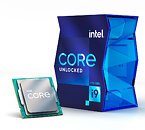
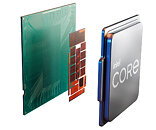
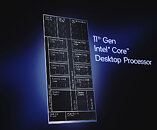
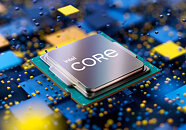
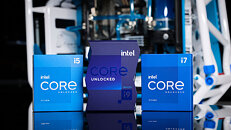







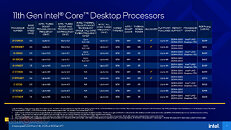
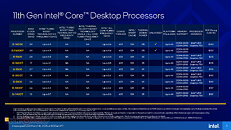
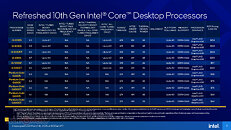
254 Comments on Intel Launches 11th Gen Core "Rocket Lake": Unmatched Overclocking and Gaming Performance
Unless you've been living under a rock for two weeks, you'll have seen the Anandtech review, right?
Here's one of the many game tests. There are other tests where the 5800X has an even sillier lead over Rocket Lake, but I chose BL3 because it's a popular engine used by so many games (Unreal).
5800X running 20% faster than an 11700K, and that's giving the 11700K the best chance possible with premium motherboard, RAM, and a monstrous 173CFM fan on a huge solid-copper Thermalright heatsink that utterly dwarfs cooling performance of most other things by virtue of being hideously loud and not something you'll realistically want to be in the same room as. Fans like that are horrible even in the datacenter when I put earplugs in and then ear defenders as well. Trust me, that 11700K had an unfair advantage over the 5800X which would perform almost identically under a quiet, affordable air cooler.
REPEAT AFTER ME:
"Gaming needs a good GPU. The CPU doesn't matter AT ALL as long as it's fast enough to feed that GPU"
Any Zen3 or 9th/10th/11th gen intel with >8T is going to be good enough to get the majority of the performance out of a sub-$1000 graphics card. My personal opinion is that the less heat and power a CPU is dumping into a system, the more thermal headroom there is for a GPU to do its boosting, ergo the best CPU for gaming is the lowest-power one that can keep up with the graphics card. Intel disqualified themselves from that specific category several generations ago....
[B]the best CPU for gaming is the lowest-power one that can keep up with the graphics card[/B]
personal preference: totally agreed. 5800x may run hot, but once you spread that heat out into a cooler theres not much to actually dissipate.Why_me: i feel like you're running on half the info, or you trusted X advice and you're not able to see contradicting information.
If i was gaming at 4K on my 3090, i wouldnt see any FPS difference from my 2700x to my 3700x to my 5800x to any intel chip, because i'd be GPU Limited.
The lower resolution (or settings) i go, the higher the max FPS and the more the CPU matters.
The only exception is certain badly coded games, and they're getting much more rare these days.
When you go high refresh rate gaming (such as a 3090 at lower res) the CPU matters to see how high your max FPS can get - see the borderlands 3 screenshot above at 360p... with the GPU not being a limit, you can see how far each CPU can actually push the frape rates. 120FPS enough for you? then a 4750G is enough. wanna max that 165Hz display? looks like a 9900KS or above is needed
Wanna run a 240Hz display, while using half the power? Time to get that 5800x, because it kinda stomps for gaming. I know it. Chrispy knows it. Anandtech knows it. Techpowerup knows it.
For whatever reason you're stuck with some flawed logic and info, so i'ma give you a TL;DR
1. GPU matters the most for gaming
2. the CPU then feeds the GPU, boosting your max FPS (and therefore the average)
3. Once you have your minimum FPS you're happy with, you can target the CPU you need...see that graph above.
4. If you're gunna make budget builds and arguments, pick a res and refresh rate first. You dont need a 5800x or 11700k for 60FPS at any resolution.
Typo I'm sure as it's one I make more often than I care to admit.
CPU Benchmarks and Hierarchy 2021: Intel and AMD Processor Rankings and Comparisons | Tom's Hardware
The prices you can argue all day long because prices CHANGE. you can argue non stop all you want about justifying whatever chip you want, and its meaningless to most of us because the prices change constsantly, and different stores, states, and countries all have different pricing
the 5800x is the literal top of the pile for gaming. Oh no its more expensive... yeah. it's 1st place. Go get a 5600x for 3FPS less and save that money and the silly arguments.
I'd rather not pay scalper prices for anything that goes into a PC right now, it just encourages them to do more of it in the future!
thats a real stretch to name two super light resource programs as if they'll take a core each... they might take 1% of one core
It reminds me of this Citroen advert:
"Travellling flat out at the GPU's limit of 178fps, the 11700F will easily overtake a 5600X producing only 176fps." :D
www.newegg.com/p/N82E16813119384
ASUS PRIME B560-PLUS $119.99
www.newegg.com/intel-core-i7-10700f-core-i7-10th-gen/p/N82E16819D118131
Intel Core i7-10700F $279.99
www.newegg.com/ballistix-16gb-288-pin-ddr4-sdram/p/N82E16820164198
Crucial Ballistix 3200 MHz DDR4 DRAM Desktop Memory Kit 16GB (8GBx2) CL16 $79.99
THE CPU DOESN'T MATTER FOR GAMING
(within reason - as long as its capable of keeping up with a GPU, having more cores or more MHz does not make your gaming better in any significant way).
The better option for a gaming build is the one that leaves you more budget for a better GPU. That's all there is to it, the GPU is the single most important part of a PC's gaming performance. I don't personally think a quad core i3 is a good idea in 2021 but you can see from the graphs you just posted that it's only about 5% slower than CPUs costing 4x as much.
A $600 graphics card and a $200 CPU will be a vastly better gaming choice than a $200 graphics card and a $600 CPU. If you don't agree with that statement then I have to conclude that you have cognitive problems far more serious than anyone here realised and you have my sincere condolences.
If you want to justify a more expensive CPU for non-gaming purposes, that's absolutely fine. I have a 3900X for crunching large datasets and I absolutely can justify the cost of it over the R5 3600 it replaced. However, doubling the cost/performance/core-count of my CPU made absolutely zero difference to my gaming. I was 100% GPU bottlenecked, as expected. As is widely-accepted by every independent reviewer on the web, as well as AMD and NVIDIA themselves; Your GPU dictates your gaming performance and your CPU will have no impact unless it is such a bad/old CPU that it becomes a bigger bottleneck than the GPU.
Oh hey, talk about GPU bottlenecks, LTT to the rescue with another ELI5:
As for dual core, that's clearly not "within reason" for serious gaming, nor can it keep up with a modern GPU, so I'm not sure why you brought it up, other than to deflect.
In case you've missed it, all I've said to you for the last several posts is that your CPU doesn't matter. Get the cheapest one that doesn't bottleneck your GPU. If you want to dump excess cash into a CPU for other non-gaming reasons then that's also fine, but don't pretend it's for gaming. Even with a 360Hz monitor, the difference between an i5-10400 and an i9-11900K is going to be pretty slim as most games will still be bottlenecked on the GPU at 1080p and above. The fact a Zen3 is faster than any Intel by a good 20-30% is irrelevant because you'll never see that difference in a real game at a real resolution with a real graphics card.
Peace and out.